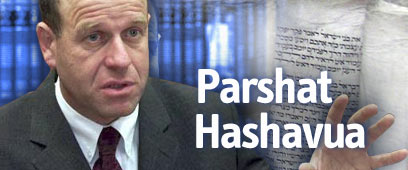

As we begin the Book of Numbers this week, the Jewish people enter the home stretch leading to the end of the long years wandering in the desert. After all the trials and tribulations of Egypt, the biblical narrative brings us to the gates of the Land of Israel, the fought-over land, the final destination.
The Book of Numbers is essentially the book of preparation to conquer and inherit the land. The book begins with a census, just two years after leaving Egypt, before the decree that the Jews would wander 40 years in the desert (to get rid of the doubting generation that came out of Egypt and to create a generation with the strength to conquer the land).
Most people are not involved with the count – a small administrative infrastructure is charged with counting the tribes, princes, flags, camps during those early days in the desert.
Perhaps this favoritism remains with us to this very day.
Levites singled out
The interesting part is that at the end of the general census, the tribe of Levi is singled out. Not counted like all the others, but singled out for work in the tabernacle and other holy and religious duties.
The Biblical reason given for singling out the Levites and making them responsible for holy work isn't clear at first glance, but is fascinating on second reading.
God says: "And behold, i have taken the Levites from among the children of israel in place of every first-born, the first issue of every womb among the children of Israel, and the Levites shall be mine. For every first-born is Mine; On the day I struck down every first-born in the land of Egypt, I sanctified every first-born in Israel for Myself, from man to beast; They shall be Mine -- I am God." - Numbers, 3;11-13.
It isn't totally clear why the destruction of Egypt's first-borns should be related to the inherent holiness of Jewish ones by God. But we know, from both academic studies and tradition, that many ancient peoples and religions attached great significance to first-born sons.
We continue to find reverberations of this phenomenon in many biblical sources: sometimes in human sacrifice. Perhaps this is one of the messages of the sacrifice of Isaac, back in the book of Genesis.
Sometimes, a first-born was set aside to do God's work from the time he was born, as was the case with the prophet Samuel.
Favoring the Levites
As we open the Book of Numbers, the Torah re-assigns the huge responsibilities of the first-born: no longer would all first-born boys be assigned to serve God. That job would be relegated to the Levites.
Apparently, something happened. The Levites, as a tribe, were turned into God's first-born, and therefore His servants. This is bad, in my opinion, not only because of the problematic symbolism of their violence – remember, it was the tribe's founder and namesake that participated in the pillaging of Nablus in response to the rape of his sister Dinah (Gen. chapter 24), thus uprooting the standing of his their father Jacob. The Levites who were overly-involved in selling their brother Joseph, who mercilessly murdered their brothers and sisters at the time of the golden calf – they, in my opinion, are not so worthy of the honor of serving God.
Expropriating identity
But I am far more worried about the implications of expropriating questions of identity. When the responsibility to connect with the Creator is placed with the first-born of each family, I know that each one of us has an equal stake in the fundamental questions of faith and national identity.
But when that responsibility is unequal and undemocratic, and is placed as a monopoly in the hands of one tribe whose "Torah is it's faith", and falls on a Jewish baby the moment he is born, it becomes a barrier between the Jewish people and their Father in Heaven.
More than a few of Israel's trials and tribulations of the biblical and first temple periods have their roots in this break, in the barrier created by the priests (cohanim) and levites (leviim) between the Jewish people and God.
More than a few of the Torah's commandments and ethical norms are slanted towards favoring the Levites. The rest of the nation bears too little responsibility in these areas.
And if this was correct for a previous generation, a generation in which almost everyone identified, felt connected, and had faith - how much more so for our generation?
Democratic identity
Instead of all of us - religious and secular, believers and heretics, men and women, new immigrants and veteran Israelis, people of different ethnic groups and colors and sexual orientations – all taking part in creating the spiritual makeup of today's Jewish people, we have placed our responsibilities in the hands of religious institutions, who jealously protect their sectarian interests and are cut off from the will of the majority.
Most Israelis are simply not part of the discussion about Israeli identity.
The decision to leave questions of identity in the hands of a small group of religious people is one of the most painful foundations of the destruction of Jewish identity in today's Israeli society, and one of the most dangerous sources of tension between state and religion, between law and Jewish law, between the Knesset and the Beit Knesset (synagogue).
We must take Judaism away from the rabbis and return it to the Jewish people. Because a Judaism that is limited to a small tribe is a Judaism of the desert, of exile, of wandering.
In contrast, a Judaism that is relevant to the whole society - that is the meaning of becoming a free people in our own country.
- The writer is a former Labor party member of Knesset















